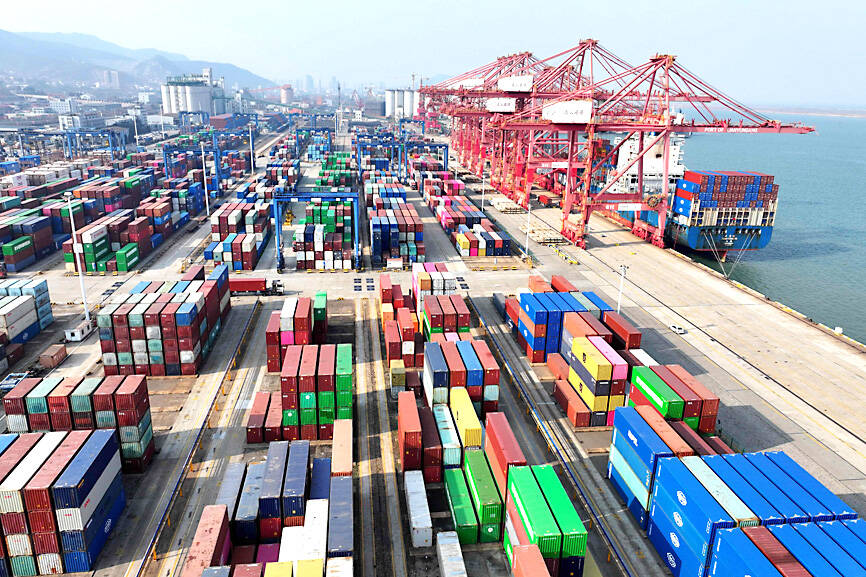China’s exports slowed last month and imports declined, falling below forecasts and underscoring potential weakness in trade at a time when its leaders are striving to boost the economy after the shocks of the COVID-19 pandemic.
Customs data yesterday showed exports grew 6.7 percent from a year earlier, down from a 12.7 percent increase in October. Analysts had estimated that exports had risen more than 8 percent.
Imports fell 3.9 percent from a year earlier, reflecting weak demand from industries and consumers.

Photo: AFP
With exports outpacing imports, China’s trade surplus rose to US$97.4 billion.
The report came a day after Beijing pledged to loosen monetary policy and provide more support for the world’s No. 2 economy.
US president-elect Donald Trump has threatened to slap tariffs of 60 percent or more on imports of Chinese goods, complicating Beijing’s efforts by threatening an area of the economy that has performed relatively well, while the property sector remains in the doldrums and consumer spending remains fragile.
Some analysts say that the latest setbacks are likely to be temporary.
“We expect exports to accelerate again in the coming months, supported by gains in export competitiveness and exporters front-running tariffs,” Capital Economics economist Huang Zichun (黃子春) said in a note.
“Import volumes declined last month, but they are likely to recover in the short run, as accelerated fiscal spending boosts demand for industrial commodities,” she said.
The effects of tariffs would likely only be felt in the middle of next year, Huang added.
Exports to the US grew 8 percent last month compared with the same period last year, while outbound goods to the EU rose 7.2 percent.
However, shipments to Russia fell 2.6 percent year-on-year compared with October, when exports to Russia rose 27 percent. The decline comes several months after the US imposed secondary sanctions on goods deemed to support Russia’s military operations, including some Chinese firms that the US accused of helping Moscow circumvent sanctions.
Exports of aluminum surged 37 percent to 668,940 tonnes last month as exporters rushed to benefit from tax discounts that were canceled from the start of this month.
That volume has only been surpassed once before, in May 2022, when the global aluminum market faced deep disruption in the aftermath of Russia’s invasion of Ukraine.
Beijing last month announced it would withdraw a tax rebate of 13 percent that for years has helped juice overseas sales of aluminum. Export rebates were also removed or reduced from Dec. 1 for a range of goods, including copper and some oil products, in a move that was seen as an attempt to tackle domestic overcapacity and excessive competition in those sectors.
Meanwhile, the boom in China’s steel exports showed signs of cooling, with volumes plunging by about one-fifth from October to 9.28 million tonnes last month, customs data showed.
Additional reporting by Bloomberg

BYPASSING CHINA TARIFFS: In the first five months of this year, Foxconn sent US$4.4bn of iPhones to the US from India, compared with US$3.7bn in the whole of last year Nearly all the iPhones exported by Foxconn Technology Group (富士康科技集團) from India went to the US between March and last month, customs data showed, far above last year’s average of 50 percent and a clear sign of Apple Inc’s efforts to bypass high US tariffs imposed on China. The numbers, being reported by Reuters for the first time, show that Apple has realigned its India exports to almost exclusively serve the US market, when previously the devices were more widely distributed to nations including the Netherlands and the Czech Republic. During March to last month, Foxconn, known as Hon Hai Precision Industry

Taiwan Semiconductor Manufacturing Co (TSMC, 台積電) and the University of Tokyo (UTokyo) yesterday announced the launch of the TSMC-UTokyo Lab to promote advanced semiconductor research, education and talent development. The lab is TSMC’s first laboratory collaboration with a university outside Taiwan, the company said in a statement. The lab would leverage “the extensive knowledge, experience, and creativity” of both institutions, the company said. It is located in the Asano Section of UTokyo’s Hongo, Tokyo, campus and would be managed by UTokyo faculty, guided by directors from UTokyo and TSMC, the company said. TSMC began working with UTokyo in 2019, resulting in 21 research projects,

Ashton Hall’s morning routine involves dunking his head in iced Saratoga Spring Water. For the company that sells the bottled water — Hall’s brand of choice for drinking, brushing his teeth and submerging himself — that is fantastic news. “We’re so thankful to this incredible fitness influencer called Ashton Hall,” Saratoga owner Primo Brands Corp’s CEO Robbert Rietbroek said on an earnings call after Hall’s morning routine video went viral. “He really helped put our brand on the map.” Primo Brands, which was not affiliated with Hall when he made his video, is among the increasing number of companies benefiting from influencer

Quanta Computer Inc (廣達) chairman Barry Lam (林百里) yesterday expressed a downbeat view about the prospects of humanoid robots, given high manufacturing costs and a lack of target customers. Despite rising demand and high expectations for humanoid robots, high research-and-development costs and uncertain profitability remain major concerns, Lam told reporters following the company’s annual shareholders’ meeting in Taoyuan. “Since it seems a bit unworthy to use such high-cost robots to do household chores, I believe robots designed for specific purposes would be more valuable and present a better business opportunity,” Lam said Instead of investing in humanoid robots, Quanta has opted to invest